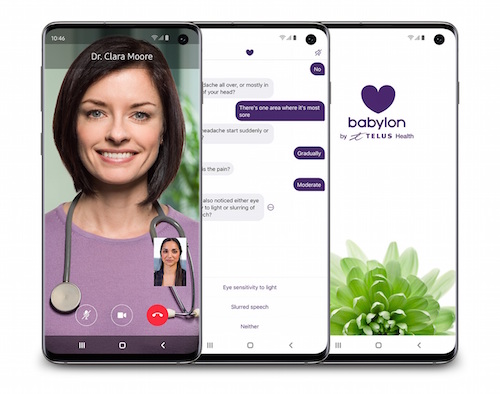How AI is Revolutionizing Canadian Health Care
There’s an App for That
In 2018, TELUS Health announced its partnership with Babylon; a leading digital health company that offers Canadians access to virtual health care technology solutions and services. The partnership aims to support and complement current health care services across the country; giving patients access to health care practitioners anywhere, anytime. Babylon has an established track record of global partnerships with three million registered users outside of Canada. Founded in 2013, Babylon Health is headquartered in London, UK.
The Babylon by TELUS Health app transcends typical online health advice by combining artificial intelligence (A.I.) technology with real face-to-face consultations. Its AI-powered chatbot was developed by a skilled team of doctors and scientists. It is described as being “designed around a doctor’s brain to provide accessible healthcare for millions in the palm of their hands.” While the virtual, one-to-one consultations with licensed physicians are currently available only to residents of British Columbia (covered under  their provincial health care plan), Canadians from other provinces and territories can still download the Babylon by TELUS Health app and take advantage of experiencing the app’s A.I. chatbot Symptom Checker. TELUS Health and Babylon hope to offer doctor consultations on the app to Canadian residents outside of B.C. in the near future.
their provincial health care plan), Canadians from other provinces and territories can still download the Babylon by TELUS Health app and take advantage of experiencing the app’s A.I. chatbot Symptom Checker. TELUS Health and Babylon hope to offer doctor consultations on the app to Canadian residents outside of B.C. in the near future.
Another symptom check app based in Berlin, called Ada, offers an A.I.-operated health platform that supports millions in better understanding their health and navigates appropriate care. Founded by a team of doctors, scientists, and engineers, the app claims to support ‘clinical decision making’ and enable both patients, as well as health care providers, access to a more effective care plan. With the help of a comprehensive medical knowledge base, Ada shares’ patient-friendly’ medical information that can help people better understand and manage their symptoms and overall health. The app allows users self-evaluate and provides recommendations such as seeking further medical help, visiting a doctor, or a specialist. Furthermore, Ada can help patients assist their doctors during medical visits by sharing their reports, which will enable medical professionals to get a better understanding of the symptoms or medical history of the patients.
Although Ada and Babylon are two popular virtual health care apps, they are not the only technologies harnessing the power of A.I. and machine learning (ML) to address medical issues and fill the demands that current health care systems experience across the world. Buoy Health is an online symptom checker that uses A.I. to analyze symptoms via thousands of real-world data-points. It calculates which illness is more likely by taking a wide range of factors into account.
Another equally interesting application of A.I. and ML in healthcare apps comes in the form of therapy chatbots. Woebot is a web-based CBT (Cognitive Behavioral Therapy) app that coaches users through mental health struggles. Built by a team of Stanford psychologists, the app aims to be another tool in the arsenal for those looking to cope with mental health issues, such as depression and anxiety. Wysa is a similar app that offers people the chance to chat with their AI-powered bot about their problems and offers advice on dealing with them.
A.I. for a Healthier Future
We can’t talk about A.I. without mentioning IBM’s Watson Health. Created to help solve some of the world’s most challenging health issues, Watson Health combines data, analytics, and A.I., along with human expertise. In oncology alone, Watson is supporting health care professionals to deliver better healthcare in over 300 hospitals and health organizations around the world. Watson is also helping researchers in the field of genomics, clinical trial matching, drug research, and most recently, imaging.
According to this Harvard Business Review, A.I. can do a great deal when it comes to health care; from diagnostics to technological applications, such as robot-assisted surgery. According to the review, the most efficient uses for A.I. currently involve aiding health care practitioners to be more productive and contemporized in the back-end processes, while the clinical applications and decision making are still quite rare. A.I. is proving to be extremely helpful in image analysis, robotic surgery, and correcting dosage errors. The real value of A.I. application, however, can be in helping to streamline and manage ‘back-office problems and inefficiencies’. The article states that non-patient related activities can represent as much as 51% of nurses’ workloads and almost 16% of physicians’ workloads. That is a considerable amount of time and effort that can be spent helping patients.
Are We There Yet?
Although it seems that A.I. might be the secret weapon to keep pace with a growing world population’s health demands, experts feel we still have a long way to go before putting our health in the hands of machines. Human oversight and support are still required to facilitate and streamline health care, manage data, and aid doctors and scientists in uncovering new treatments.
During his speech at Precision Medicine 2019, Professor, Jonathan Zittrain tempered the enthusiasm and ever-increasing use of A.I. and machine learning in health care, likening it to being “kind of an asbestos.” Zittrain explains, “... it’s all over the place, even though at no point did you explicitly install it, and it has possibly some latent bad effects that you might regret later after it’s already too hard to get it all out.” He drove his point home by showing how a Google algorithm had mistaken an image of a tabby-cat for guacamole after only a few pixels were changed. Zittrain’s simple, yet extremely effective example left many pondering the vulnerabilities and weaknesses in A.I. today.
When it comes to entrusting our health to a computer, there is no easy answer. A.I. and ML can help our health care providers serve us better, be it by virtual triaging to identify when it’s time to see a health practitioner, making medical staff’s lives easier by managing mundane tasks, helping surgeons in the Operating Rooms, or empowering scientists in discovering new life-saving drugs. One thing is for certain. A.I. and ML still depend on human supervision, and the technologies are nowhere near ready to replace your doctor with a computer screen anytime soon.

Ellie Somfelean
Ellie is a Reporter and Content Marketer with CMSC Media. She is passionate about social media and digital marketing. She has a vast experience with content creation, influencer marketing and brand promotion.